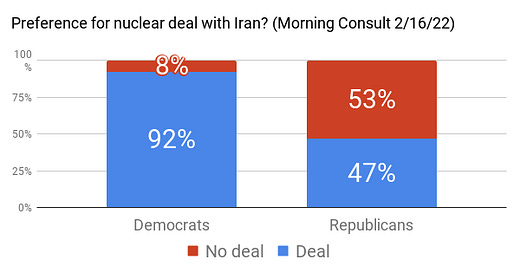Republicans stoke war with Russia to derail peace with Iran
A political gambit buried in the House GOP's letter to Biden threatens to escalate hostilities with both countries.
House Republicans have sent the Biden administration a letter voicing their opposition to its efforts to reach a nuclear deal with Iran. Following just ten days after a a nearly identical statement from Senate Republicans, the letter suggests significant consensus among the party and reflects a sharp partisan divide, as a new Morning Consult poll makes …
Keep reading with a 7-day free trial
Subscribe to Carl Beijer to keep reading this post and get 7 days of free access to the full post archives.




